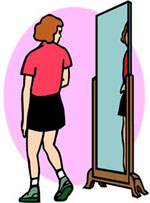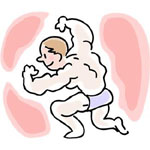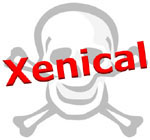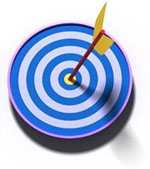The best strategies for keeping weight off after your hCG diet require simple changes in lifestyle and diet. Here are the top 5 ways that have the most impact on successful long-term weight management.
.
.
.
.
.
Hitting Your HCG Diet Target
Let’s assume that, using real hCG, you have reached your target weight and have reduced your body fat percentage along with it. I include that last part because many people have used fake hCG, herbal hCG (which does not exist), or homeopathic hCG, and have reached an untenable weight loss target without reducing body fat. This just means that, if you have done so, then you have starved yourself to reduce weight and are now set up for a quick rebound weight gain.
Fortunately, the top 5 strategies for keeping weight off after the hCG diet are helpful regardless of whether you have followed the correct hCG weight loss protocol. In fact, following these strategies in the first place would most likely have prevented any need for doing the hCG protocol at all. In other words, you would not have gained too much weight to start with.
Stay Informed, with a Good BS Detector
 It is up to you to figure out what is best for your body. Not your doctor. Not your nutritionist. Not your friends or family. Not me. Just you. Keep this in mind: Hundreds of weight loss diets have been created in the past few decades. Some are good, and some are bad. Scientific research can be found that supports or rejects almost anything. (Have you seen the research that says the hCG diet doesn’t work?)
It is up to you to figure out what is best for your body. Not your doctor. Not your nutritionist. Not your friends or family. Not me. Just you. Keep this in mind: Hundreds of weight loss diets have been created in the past few decades. Some are good, and some are bad. Scientific research can be found that supports or rejects almost anything. (Have you seen the research that says the hCG diet doesn’t work?)
Example 1: If you have a fine-tuned BS detector, you might have already discovered that the low-fat craze is a bunch of bunk for weight loss. In fact, it is BAD for human health! Yet look at the thousands of food products that offer ‘low-fat’ as something that is good for you.
Example 2: Dietary cholesterol – i.e., the cholesterol that you consume in foods – has almost no impact on your cholesterol levels. A low cholesterol diet has no impact on your health. This has become such a gigantic myth that, any day now, I expect to see 7-Up come out with a label claiming it to be ‘cholesterol free’. Okay, that was a sarcastic digression. You get the idea.
Things change. Research provides new insights. Keep up with them through blogs such as this one.
Scammers abound, especially on the internet. They always will. Some are obvious, and some are tricky. Your only defense is a good BS detector. If you are not sure about something, ask someone, preferably several someones, who has expertise and whose opinion you respect.
Knowing where to find good information that is truly helpful for you may seem overwhelming at times. I provide some direction on how to simplify that task, with links to other resources later in this post.
The Main Categories
You can scroll down to see my comments on the following main topics that encompass almost all you need to know for successful long-term weight management:
- Basic Nutrition
- Eating
- Exercise
- Stress Management
- Hormone Balance
Some of these seem obvious, don’t they? Of course. There is a lot to know and do. My strongest advice is that you do something, anything, to keep making progress in each and every one of these categories every day. Keep making progress every day.
One More Thing Before We Get Started
Overweight is not due to eating too much or exercising too little. It is from poor metabolism, which comes from an imbalance in multiple kinds hormones. Causes of hormone imbalance may be developmental (i.e., aging) or lifestyle choices, or both. Fortunately, it can be corrected or at least ameliorated.
Now for some details:
1. Basic Nutrition
You absolutely must have the right vitamins, minerals, and other natural products, in the right amounts, for any healthy weight management at all. Maybe you already supplement with a multivitamin/multimineral product, since you know that the Standard American Diet (SAD) is so crappy. If so, this is a good start. Unless you are taking something like Centrum, or a generic analogue, which has to be the worst multivitamin ever foisted on the American public.
The RDA (Recommended Daily Allowance) of vitamins and minerals, as defined by your federal government, is sort of okay. It falls way too short, however, in a few of the more critical vitamins, including vitamin C, vitamin D3, vitamin E, and most of the B vitamins (especially B-12). The low RDA for certain minerals also underlies the observation that most Americans are deficient in magnesium, potassium, and iodine.
Basic nutrition also entails what we get, or what we are supposed to get, from a nutritious diet. It is not likely that anyone can get sufficient nutrition from foods that are mass produced by modern agriculture. The best you can do is eat whole foods and avoid processed foods. Let me repeat that, with emphasis:
Do we really need to talk about what this means? You have probably heard this advice a million times already. If food is boxed, bagged, ground up, extracted, sweetened, full of additives, or otherwise NOT fresh, simply do not eat it. (By the way, this is my agenda for dramatically improving the education system in the U.S. — any teachers out there? Get kids off of crappy diets, then watch how their behavior, attention, and brain function all improve. Research on this is solid.)
Even so, since you will not get enough nutrition by eating only whole foods, you must take supplements – the right supplements. This means more than just vitamins and minerals. In fact, the most important categories for supplementation are:
- Vitamins and minerals
- Probiotics
- Enzymes
- Essential fatty acids
- Greens formulas
 If you don’t know what these are, or where to find out easily, I suggest you get my summary and recommendations about them, called The Five Pillars of Basic Nutrition. I don’t charge for it, and you can request it at my main natural health blog here: HerbScientist.com. When you do so, you will also get a short report on achieving hormone balance, which is equally important to men and women.
If you don’t know what these are, or where to find out easily, I suggest you get my summary and recommendations about them, called The Five Pillars of Basic Nutrition. I don’t charge for it, and you can request it at my main natural health blog here: HerbScientist.com. When you do so, you will also get a short report on achieving hormone balance, which is equally important to men and women.
The closer you can get to supplying your body with basic nutrition, the better your health and metabolism will be in countless ways. My report is a recommended starting point.
2. Eating
Notice that I do not call this ‘dieting’. Eating entails at least three components, which comprise more of a lifestyle, without the connotation of deprivation that accompanies ‘dieting’.
a. How Much to Eat
Calories have a bad reputation, which is a complete puzzle to me from a biochemical point of view. Calories are a measure of heat … that’s it. The potential for releasing heat from foods is mindlessly cited as being important metabolically. You known, 4 Calories per gram of carbs and all that nonsense. That is Calories with a capital ‘C’ because it really means ‘kilocalories’, or ‘thousand calories’. Yup, a gram of carbs can yield 4,000 calories if the whole amount is completely incinerated to carbon dioxide and water.
This is not what your body does. Your metabolic efficiency is probably somewhere between 10-20 percent of total incineration. It varies depending on your health status, your age, your hormone imbalance, your basal metabolic rate, and many other factors. This is why two people can eat the exact same foods in the exact same amounts, whereby one becomes obese and one does not.
My point here is that you do not necessarily have to worry about counting calories. It is an ineffective strategy for weight management in the first place. Here is what to do instead:
There are no rules beyond that. Oh, if you want to eat slowly so you don’t get ahead of your satisfaction response, that would be a good idea. The amount you eat, however, is far less important than the other two components of eating, as described below.
b. Meal Spacing
 Way too much bad advice on when to eat is spread thoughtlessly by people who should know better. It has become dogma. There is actually some interesting research on this topic – i.e., how often you should eat. Unless you are a bodybuilder or high level athlete, the recommendation that you have to eat 5-6 meals and/or snacks per day, to ‘keep your furnace burning’, is pure bunk.
Way too much bad advice on when to eat is spread thoughtlessly by people who should know better. It has become dogma. There is actually some interesting research on this topic – i.e., how often you should eat. Unless you are a bodybuilder or high level athlete, the recommendation that you have to eat 5-6 meals and/or snacks per day, to ‘keep your furnace burning’, is pure bunk.
Here is the logical and scientifically supported pattern for spacing meals for optimum metabolism:
- Eat breakfast if you are hungry, although its importance is overblown.
- Eat lunch no fewer than 5-6 hours after breakfast.
- Eat dinner no fewer than 5-6 hours after lunch.
- Never snack after dinner.
- Eat breakfast, if at all, at least 12 hours after the prior evening’s dinner.
That’s it in a nutshell.
Now there are lots of physiological reasons for this pattern of eating, not the least of which is how it balances out a host of hormones that respond to what you eat. The big three of these include insulin, leptin, and growth hormone.
If you feel as though you need additional convincing about this approach to meal spacing, I refer you to a book of mine that includes a more thorough discussion. It is available at no cost here (you guessed it, on another blog): Belly Fat Book.
In fact, this is a manual that you can use regularly for digging into the other strategies that I am posting here on long-term weight management. (It’s pretty good, too, although I might be biased because I wrote it.)
This includes:
c. What to Eat
You already know what I think about low-fat diets. Avoid them like the plague, which is exactly what they are on human health. Indeed, if we are focusing only on the ‘Big 3’ of food groups, the least important one is carbohydrates. You can survive quite well if you never ate another carb in your life. You must have protein and fat to be healthy.
That sort of lets the cat out of the bag on what to eat. It is a little more complicated than that, though, which I explain in more detail in my Belly Fat Book.
What to eat is closely accompanied by what NOT to eat. I am learning more about this all the time. The best advice is what I mentioned earlier about avoiding processed foods. It would be hard to go wrong if that is all you ever did.
This is a great place to mention the worst kinds of foods of all time: 1) modern wheat; 2) high fructose corn syrup; and, 3) refined sugar. Yup, the worst in human history. Have I made myself clear on that?
Although my recommendations on these are relatively new, and not discussed in detail in my book, here are some good resources for you to explore about these dietary evils:
- My article: High Fructose Corn Syrup – Deadliest Food Additives
- The book, Wheat Belly: Lose the Wheat, Lose the Weight, and Find Your Path Back to Health
by Dr. William Davis (also check out the Wheat Belly blog)
- Anything by Gary Taubes, such as this one for the public (not his full research book, ‘Good Calories, Bad Calories’): Why We Get Fat: And What to Do About It (Vintage)
3. Exercise
 Of course, exercise – i.e., physical movement – is good for you. Not all of it, just some of it. Most of the exercise that I see people doing at my local LA Fitness is inefficient, and a lot of it is downright harmful. Fitness trainers repeat what they have heard from other fitness trainers. They do not keep up with the latest research.
Of course, exercise – i.e., physical movement – is good for you. Not all of it, just some of it. Most of the exercise that I see people doing at my local LA Fitness is inefficient, and a lot of it is downright harmful. Fitness trainers repeat what they have heard from other fitness trainers. They do not keep up with the latest research.
You may be pleasantly surprised at how quickly and easily you can build lean body mass when you do it right. You can see what that means, with links to a series of videos that show you exactly what to do in my Belly Fat Book.
I also point out the most effective ways to exercise for boosting fat metabolism. Since I wrote the book, however, I have also discovered the benefits of sprint-interval training. I have been a long distance runner for more than 30 years. Unfortunately, training for fitness and endurance the old way (long, slow, torture) was getting harder and harder.
What I discovered instead is a way to train that builds endurance in a lot less time than running 25-40 miles per week, which is what I used to do. It involves a training approach and a running style that have literally saved me from the knee-replacement crowd, without dropping my level of fitness.
The research and personal experience for my current approach are summarized in a series of articles on, you guessed it, another blog, here: Barefoot Running Archives at PersonalFitnessResearch.com.
What I have discovered for my running program applies to endurance fitness training by cycling, treadmill work, stair-stepper, or any other similar machine. Here is what is really great about all this: I only need to workout 1-2 times per week, with a total sprint time of less than 5 minutes, to maintain excellent fitness. Take a look at that link and the articles listed there to see what I mean.
4. Stress Management
 You can skip this section of you don’t have any stress. Just kidding. Everyone has to deal with stress. And it takes a huge toll on health, including how our bodies use or store fat. To be succinct, stress will make you fat.
You can skip this section of you don’t have any stress. Just kidding. Everyone has to deal with stress. And it takes a huge toll on health, including how our bodies use or store fat. To be succinct, stress will make you fat.
The most common recommendation for Americans regarding managing stress is to get better sleep and more of it. Easier said than done. It seems as though an article comes out every week in some national magazine or another about how to improve sleep. If you run across one, take the advice to heart.
You can also help manage stress through supplements. For example, these are all helpful: magnesium, melatonin, various herbs (kava kava, valerian, hops, mulungu, American ginseng, chamomile), 5-HTP, and a wide variety of others. Notice that I do not include prescription drugs. They are generally awful in too many ways to be any good for you.
Meditation of any kind is almost always going to be helpful.
If you are overstressed, your cortisol production is out of whack, your adrenal glands are about to give out, and you don’t get enough good sleep, your metabolism may never be right. Gaining weight will seem like a continuous, inexorable march to obesity.
Just do what it takes to manage stress. You will be better off for it in every way.
5. Hormone Balance
Hormone balance is the foundation for lifetime health and successful weight management. Your body makes hundreds of hormones – steroid hormones, thyroid hormones, neurohormones, protein hormones. The list seems to be endless. And many of them are interdependent. They are responsive to diet, lifestyle, stress, and aging.
Here are the Big 3 to pay attention to, probably more than you have been doing.
Thyroid Hormones
Steroid Hormones
Human Growth Hormone
All of these classes of hormones have a direct impact on everything that you do, especially on what you do to influence your metabolism. And all of them can be optimized by what you eat, by how you exercise, by the nutritional supplements that you take, and just generally by how you live your life. The good news is that, even if they are way out of balance, you can do a lot to put them back into balance. When your hormones are balanced, you will have the slim body that you are supposed to have, you will feel better and more energetic, and you will be healthier.
Here are the basic pointers on achieving hormone balance that explain in more detail in my Belly Fat Book:
- Thyroid: You are almost certainly iodine deficient. A simple iodine supplement takes care of that quickly.
- Steroids: Testosterone/estrogen balance depends on dozens of factors. Generally, you can benefit from using a good progesterone cream (men, too!).
- Human Growth Hormone: The Grandaddy of All Hormones. The key is to get your pituitary gland to release more of it. Good sleep helps. The right meal spacing helps (see above). Certain supplements can help, depending on your age.
If you are fortunate to have the financial and medical resources to take growth hormone injections, go for it. This is the fastest and surest way to reverse the symptoms of aging, including gaining weight.
Supplement Information Bonus
Now for the rest of us, some relatively new research shows how to stimulate growth hormone release, build more lean body mass, and get stronger by taking certain kinds of supplements. Bodybuilders have pioneered the way for some of this research.
However, at least one supplement has been shown to increase lean body mass even in the elderly (i.e., not too much older than me!) and even in the absence of exercise. Is this a dream come true or what? And its effects can be boosted when combined with other ingredients.
I have a whole series of articles on this subject that start with this one: Mix Your Own Bodybuilding Supplements Formula. This is a fascinating topic for everyone, and especially for seniors (AARP-qualified, age 50 and up).
Indeed, as far as I’m concerned, this kind of supplementation is a no-brainer for those of us who really want to be fit, healthy, and slim for the rest of our days.
How About Diet Pills?
 Although I do comment on and recommend certain supplements here and there, I am not too keen on diet pills in general. First off, prescription diet pills are dangerous, so don’t take anything that has been approved by the FDA. Second, most weight loss supplements are just plain junk. It is a challenge to find the good ones, of which there are a few.
Although I do comment on and recommend certain supplements here and there, I am not too keen on diet pills in general. First off, prescription diet pills are dangerous, so don’t take anything that has been approved by the FDA. Second, most weight loss supplements are just plain junk. It is a challenge to find the good ones, of which there are a few.
Websites that review these kinds of products almost always have an agenda, which is to sell you something. For that reason, I have launched a relatively new blog that offers objective reviews of diet pills, prescription and over the counter, natural and synthetic. There is nothing to buy there. I named it TheDietPillsReview.com – catchy, huh?
If you are tempted to experiment with any kind of diet pills, please take a look at what I have to say first. If I have not yet reviewed what you are looking for, let me know in a comment on any of the posts on my diet pills blog. I will see what I can find out what you want to know.
That’s It for Now
You have a lot to digest (!). I hope that at least some of the information and direction that I have provided here gets you going in the right direction.
Comments? Questions? Suggestions? Criticisms?
Just submit them in the comment section at the end of this post. I know that I have covered a huge topic rather superficially here. So I am open to a vigorous discussion to fill in the gaps.
All the best,
Dr. D
